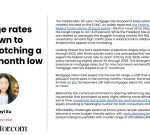
What is a portable mortgage and why is it being proposed?
A “portable mortgage” is the idea that you could take your existing mortgage contract, and critically your current interest rate, with you when you move. Federal Housing Finance Agency Director Bill Pulte’s proposal is a brute-force attempt to solve the lock-in effect: If homeowners aren’t moving because they don’t want to give up a 3% mortgage for a 6% one, why not just let them carry that low rate to their next home? Today, of course, when a homeowner moves, they prepay their existing loan and take out a new one at prevailing rates. Prepayment is required under standard language in existing mortgage contracts, which support the securitization system that makes it easier for investors to funnel money into mortgage lending. This process ultimately helps lower mortgage rates for borrowers.
How would portable mortgages affect the housing market?
In theory, the rate gap (the difference between the borrower’s own rate and the current market rate) is a notable drag on mobility, so portable mortgages might unlock some activity and free up inventory. But empirical work shows the lock-in effect explains only about half of the recent decline in mobility, so portability is unlikely to bring sales fully back to normal levels. And the benefits would be highly selective: Only current mortgage holders with low rates would gain; renters and homeowners without a mortgage would still face today’s rates.
As a result, the broader housing market impacts of portable mortgages point to higher, not lower, home prices. Anyone able to “port” a 3% mortgage into a new purchase would effectively be bidding with cheap financing in a 6% world. That added purchasing power would push prices up, while renters and mortgage-free owners would still face today’s higher rates—only now with even higher list prices. The new dividing line would not be purely generational, but rather who already holds the “golden ticket” of a COVID-19 pandemic-era mortgage versus who doesn’t. A buyer pool fractured by financing conditions would widen an already stark divide among younger households, with current owners continuing to gain while renters fall further behind.





